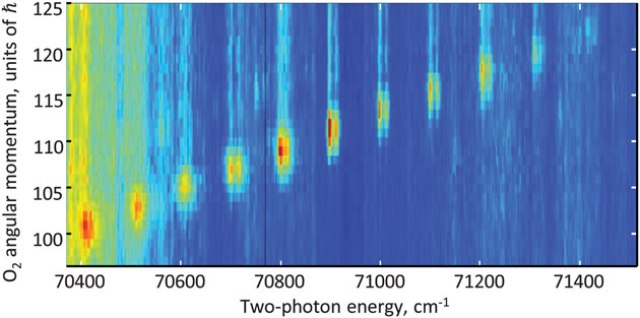Jan 24 2014
UBC scientists have developed a new type of optical spectroscopy, dubbed “centrifuge spectroscopy”, capable of probing molecules in an unprecedented regime of ultrafast “super” rotation. An optical centrifuge is a laser pulse with rotating linear polarization. Due to the light-induced dipole moment, molecules line up along the polarization vector and faithfully follow its rotation, spinning up to ultra-high angular frequencies, which cannot be reached by any other means.
The research group, led by PHAS profressor Valery Milner, has applied the new method to molecular oxygen, exciting the molecules from the ground rotational state to the quantum states with rotational angular momentum exceeding 120 ћ, and carrying more than 2.5 eV of rotational energy. For comparison, the most populated rotational state of O2 at room temperature has an angular momentum of 9 ћ.

Observing, let alone studying, molecules at such extreme rotational states is not easy. To decipher the rotational spectra of electronically excited oxygen, Aleksey Korobenko, the leading graduate student on this project, and Alexander Milner, the senior scientist in the group, use a combination of two different detection techniques: coherent Raman scattering (CRS) and resonance-enhanced multi-photon ionization (REMPI). By carefully controlling the rotational speed of the centrifuge, REMPI spectra are recorded as a function of the molecular angular momentum (see Figure). The results, recently published in Physical Chemistry Chemical Physics and highlighted in Chemistry World, include the correction of a previously poorly known rotational constant of O2, and the observation of a surprising rotational line narrowing at J≈120.
The technique is not limited to spectroscopic applications and paves the way for a number of exciting future studies. Multiple theoretical works suggest that molecules excited to these extreme rotational states will exhibit many fascinating properties, such as unusual scattering from solid surfaces, deflection in external fields, macroscopic gas vortices, THz emission, rotation-induced magnetism and selective chemical bond breaking.